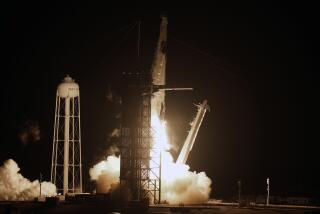Nothing to Gain
- Share via
The shuttle Atlantis glided into Edwards Air Force base Tuesday after its crew launched a $500-million spy satellite that will provide all-weather coverage of most of the Soviet Union. That is what the Pentagon’s right hand was doing.
Its left hand was goading the Soviet Union into a race to see who would be the first to design weapons to shoot such satellites out of the low heavens at will.
Congress has stepped in before to halt testing of anti-satellite weapons, and apparently it must do so again before the nonsense gets out of control.
For as long as the Pentagon has been researching defenses against nuclear missiles, it has suspected that the most primitive “Star Wars” system might fail to stop a single incoming warhead and yet be very good at destroying satellites. The most recent Star Wars hardware apparently confirms the thesis.
The United States has a number of vested interests in not prodding the Soviet Union into an ASATs race. For example, while satellites are military weapons, they are important to peace. They make it difficult for either superpower to start getting ready for war without the other’staking notice. The incredible advances in technology represented by the satellite put into orbit by Atlantis will make it even more difficult for the Soviets to prepare for a sneak attack.
Although the Pentagon considers the La Crosse satellite a major secret, trade magazines and others say that it uses a form of radar that makes it possible to “see” anything 10 feet long or longer through fog or cloud cover. That would include missiles mounted on flatcars--a weapon that worried Washington officials because the Pentagon would not know where to hunt them down in a crisis.
Finally, Washington should want to avoid an ASATs race because Soviet satellites are not built to last, and Moscow is more often ready to replace a satellite on short notice than is the United States.
The Soviets have a very primitive ASAT of their own, one that has failed in tests more often than it has succeeded. There is no evidence that Moscow has tried recently to improve on its satellite-buster. The United States should do what it can to keep it that way. It certainly has nothing to gain by pressing the Soviets to learn to shoot down anything as useful to peace as its new satellite.
More to Read
Sign up for Essential California
The most important California stories and recommendations in your inbox every morning.
You may occasionally receive promotional content from the Los Angeles Times.










